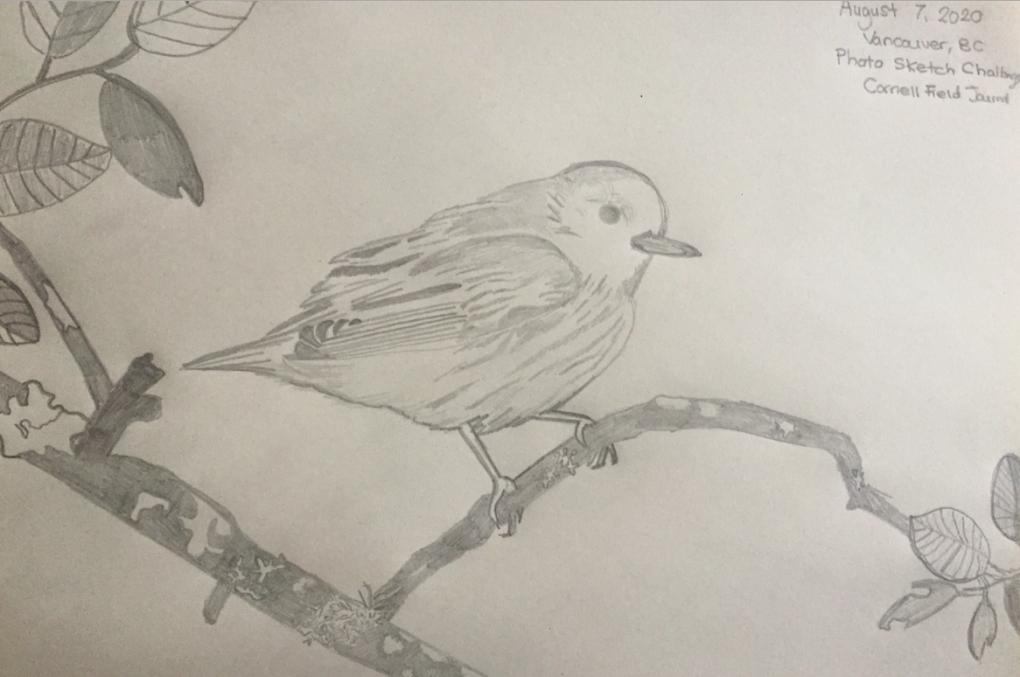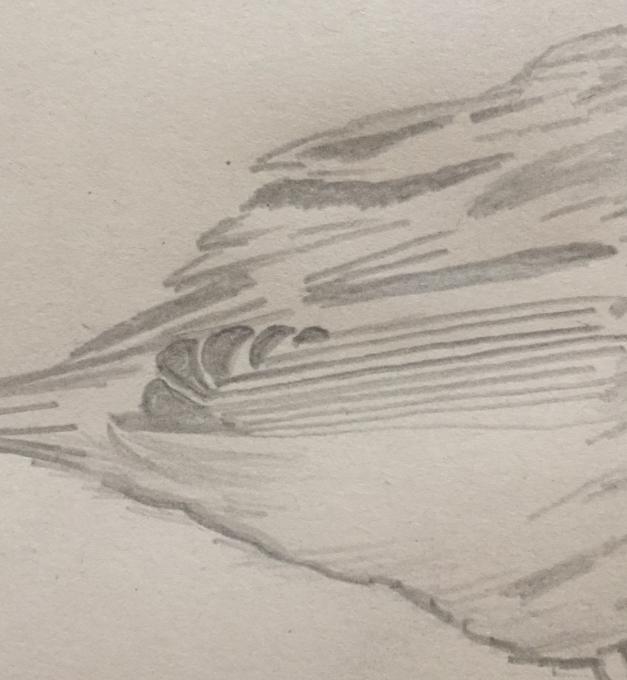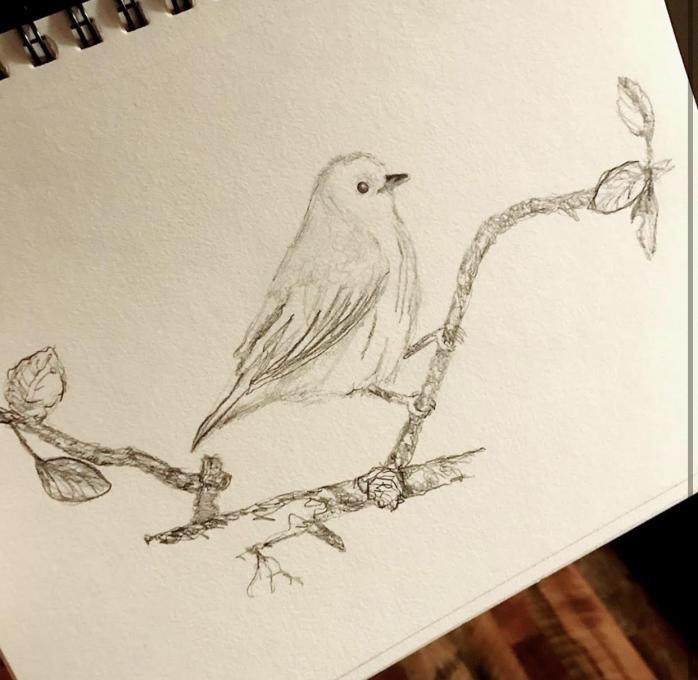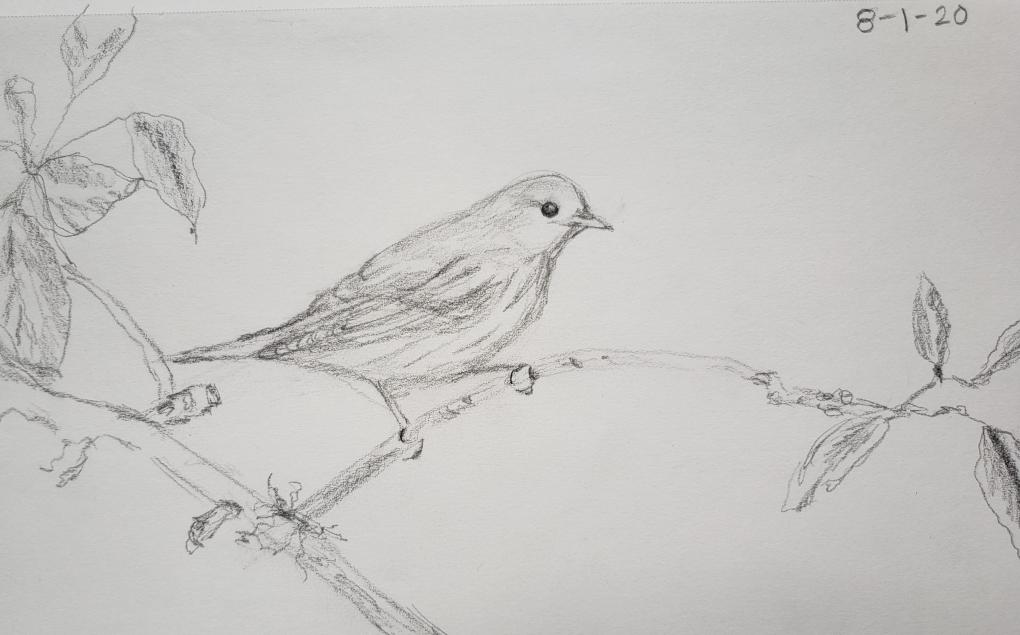The Cornell Lab Bird Academy › Discussion Groups › Nature Journaling and Field Sketching › Jump Right in!
-
Drawing animals is completely new to me so it was interesting trying to use concepts of proportions on a new shape for me. I noticed the rule of thirds for drawing human faces pretty much applied to a birds face which I found interesting!

-
I found drawing from a photo gave me time to look at it and notice color, shape, the lines on its breast. After drawing it, I tried using watercolor to add color notes. My experience is with oils not watercolor, and need to realize it has to dry so the darks don't run all into the light colors. Maybe using watercolor pencils will help with controlling this?

-
My 6yo wanted to join me in this class and so we went with the bigger pieces of paper, and we both have already learned so much. Ignore the plentitude of zucchinis and zuke bread in the background. Part of why I'm enjoying this so much is a) my daughter is totally interested and is working through some learning curves as I work through my own and b) I'm forcing myself to slow down and look at things in a different way. I love that we all have our own different styles and embrace them all. An image on the computer screen for some reason is more straight forward for me... I can disassociate from the image - the feet with their upturned toes in the back - the different colors in the beak, the beautiful green background - I find it difficult to find the right colors yet, but it is good to sit with an image for a while and try to tease it apart.

-
I enjoyed drawing from a photo. I could focus on it seeing details. Drawing it came fairly easily. A little challenging was the intricate lined feather pattern. Also with just pencil, obviously the color was missing, thus drawing with pencil trying to distinguish the different colors black and reddish, was a challenge. I might have not noticed the little clawed feet, the exact proportions of the bird, and the detailed coloring, had I not been asked to draw it. Since birds in nature rarely sit still, these details might be missed when nature journaling.
-
 It was easy to get lost in the detail and miss the overall shape.
Nice to notice the many layers and different angles of the wings. Thanks to the bird for HOLDING STILL. 😇
It was easy to get lost in the detail and miss the overall shape.
Nice to notice the many layers and different angles of the wings. Thanks to the bird for HOLDING STILL. 😇 -
I would have best seen the image in the field but up close. I have learning disabilities galore when it comes to spatial, visualization . Drawing will be challenge but not the writing. I just did a pencil drawing, no color, in effort to draw warbler. As it's in my journal I don't know how to upload, but think I'll try another sketch as mine is so tight and restricted
-
1. I typically draw from photo or memory, but looking at a screen too long gives me awful headaches. Getting the tail’s shape right was hard, but the other parts went okay. 2. I might not noticed the many shades of yellow on the chest and wings, but I did a lot more as I colored. It would, for me at least, because it would not be as accurate as I would want it to be.

-
the process was daunting, as it has been years since picking up a pencil and drawing. but in another sense, it was exciting as I paid much more attention to the size shape and details, color of the bill and legs, shape of the breast length of the tail shape of the leaves etc. I enjoyed it...rather than worrying about the exactness and outcome.
-
 How did you feel about drawing from the photo? I prefer to be outside verse at my computer. (I teach online due to covid, and spend too much time on my chromebook! )
What came easily and what was challenging? I feel more confident in plants than birds, I think the dark black lines draw you into this sketch.I could not figure the correct shape or size for the head of this bird.
Was there anything in the photo that you might not have noticed if you weren’t asked to draw it? Would this make a difference when nature journaling? I really began to look at where the tail wad located and the shape of the break. I also began to notice the colors and lichen on the tree branch. The shades of yellow on the bird's feathers.
How did you feel about drawing from the photo? I prefer to be outside verse at my computer. (I teach online due to covid, and spend too much time on my chromebook! )
What came easily and what was challenging? I feel more confident in plants than birds, I think the dark black lines draw you into this sketch.I could not figure the correct shape or size for the head of this bird.
Was there anything in the photo that you might not have noticed if you weren’t asked to draw it? Would this make a difference when nature journaling? I really began to look at where the tail wad located and the shape of the break. I also began to notice the colors and lichen on the tree branch. The shades of yellow on the bird's feathers.
-
I have a hard time capturing the right scale from a picture . It's nice the bird isn't moving! Felt like I captured a "feel" here, not necessarily a scientific sketch. Still working on that.

-
The nice thing about drawing from the photo was that the bird was still :) And so close up that many tiny details became visible. All I had with me today was a box of 6 crayon colours so I tried to make do with what I had. Realised that there was a lot to learn and capture in how the feathers in the wings were laid out. Realised the background needed more work to become smooth. Realised I had to learn a lot about crayons. Wondered how to capture the expression in the birds eye. Details may not always be so visible in nature journalling as our subjects will be far away and on the move. Drawing made me pay attention to all the small details and see them carefully .

-
I liked drawing from the photo as it allowed me to really look at details. Perspective in regard to orientation of beak and legs did not come easily, and I found I kept wanting to tweak the drawing (my perfectionist side) and finally had to lay the pencil down. Even though I didn't add color in this drawing, I realized how many shades of yellow this "yellow bird" has that I may not have seen if it was on the wing.

-
2 The thin lines on the wings 1. The beak was ard
-
I am just getting back to the lessons and wanted to pair my drawing with my original reply:
 I enjoyed drawing from the photo, since I could focus on details without having to rely on my memory or worrying about the bird flying off. The easiest was approximating the general shape of the warbler. The more challenging aspects were reproducing the relative orientations of the different parts of the anatomy: head angle, leg placement, layering of wing feathers, and eye size direction of gaze. My color and color distribution was off as well. There were so many details I would have missed, if I had not attempted to draw the warbler, not that I was able to reproduce them in my drawing. I do think that including sketches in my nature journals would improve them a lot.
I enjoyed drawing from the photo, since I could focus on details without having to rely on my memory or worrying about the bird flying off. The easiest was approximating the general shape of the warbler. The more challenging aspects were reproducing the relative orientations of the different parts of the anatomy: head angle, leg placement, layering of wing feathers, and eye size direction of gaze. My color and color distribution was off as well. There were so many details I would have missed, if I had not attempted to draw the warbler, not that I was able to reproduce them in my drawing. I do think that including sketches in my nature journals would improve them a lot. -
 It was difficult to decide where to begin. I chose the branch. The feet were surprisingly easier than I thought and the part that seemed easy at a glance proved elusive. I could not get the head shape right from my eyes to the paper. The proportion fell short and while quick sketching I don’t erase so he has more of a dove shape. In the wild I’m certain to have missed the claws just so on the branch and those burnished streaks on the throat as individual marks. Looking forward to instruction on proportion and pencil techniques.
It was difficult to decide where to begin. I chose the branch. The feet were surprisingly easier than I thought and the part that seemed easy at a glance proved elusive. I could not get the head shape right from my eyes to the paper. The proportion fell short and while quick sketching I don’t erase so he has more of a dove shape. In the wild I’m certain to have missed the claws just so on the branch and those burnished streaks on the throat as individual marks. Looking forward to instruction on proportion and pencil techniques. -

-

-

-
I enjoyed drawing from the photo. What came easily was my understanding of the posture of the bird and the relationship of the eye to the beak. I am having difficulty getting the layers of wing and tail feathers as well as how to draw the legs and feet properly. If I took more time I wold have worked on the branch and the lichen of the branch, as well as, the leaves to show where the bird was perched.
-
 Hello all,
the warbler was a very nice starter project. I enjoyed studying the colorful feathers and their different yellow tones. This drawing was done by color pencil on watercolor paper. In future I want to use watercolor as my previous colors.
I love all the different warblers here in this community. It is always great to be surounded by other nature-addicted artists. Looking forward to more!
Hello all,
the warbler was a very nice starter project. I enjoyed studying the colorful feathers and their different yellow tones. This drawing was done by color pencil on watercolor paper. In future I want to use watercolor as my previous colors.
I love all the different warblers here in this community. It is always great to be surounded by other nature-addicted artists. Looking forward to more! -
1. I had fun with it - I tried to do it relatively quickly and not to get overly caught up in the details. I find wings to be difficult - appropriately preserving white space. The eye and bill came pretty easily. 2. I was surprised with the shading on the head - unsure if this is just the color of the photo or feathers. Also it made me notice some of the color patterns in the wings which I would not have noticed otherwise.

-
Accidental reply :)
-
I really enjoyed sketching from a still photo! I started with the branch and lichen because I have practiced drawing those subjects before and then worked on the bird from the feet up. I was a little intimidated by the bird. I struggled with the beak of all things! I'm also working on learning to capture light and shadow. But, in the end, taking the time to slowly sketch from the photo I found little patterns in the wings which I chose to shade in darker to draw the eye to that particular part of the drawing. That wound up being my favourite part of the sketch.


-
i love scrolling through and seeing everyone's warbler!

-
Putting that first mark on the paper was challenging. I started with a couple basic egg shapes for the body and head then worked from there. The hardest part was the eye and the beak and making it look like a real bird. I would not have appreciated the shadowing and nuances of color if I were not asked to draw it.

Read More:
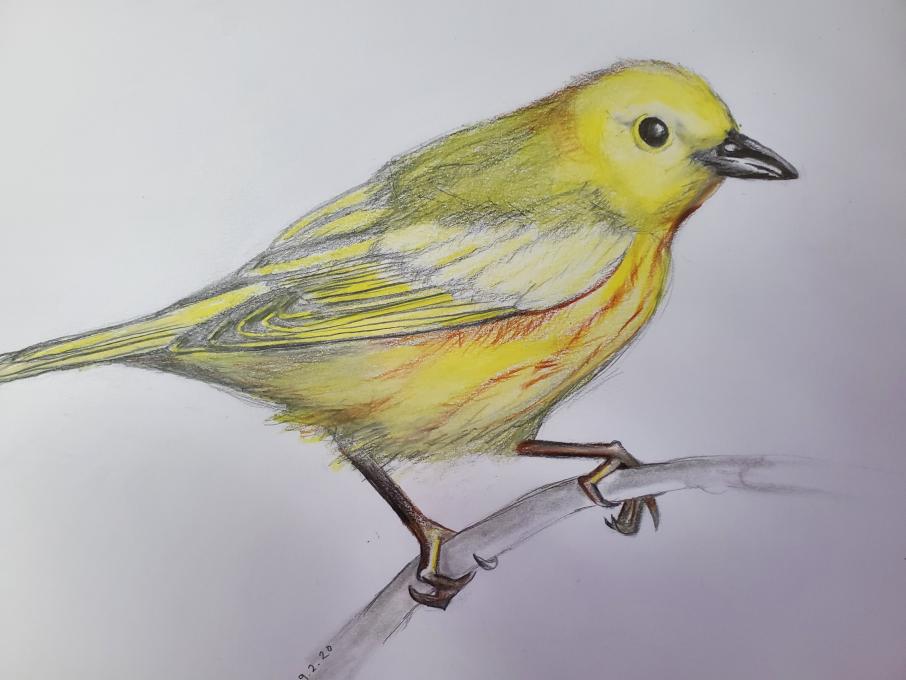
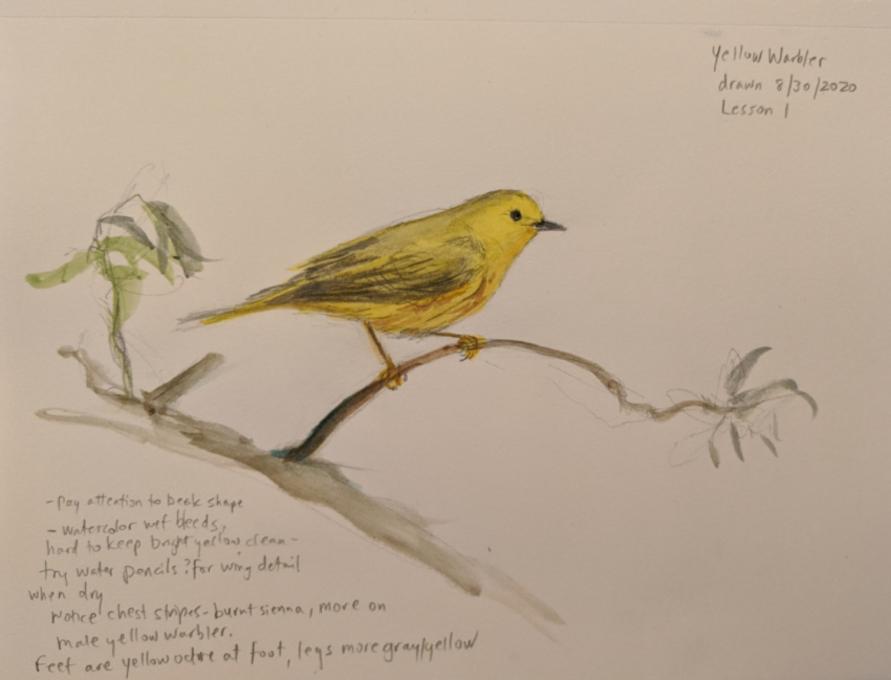
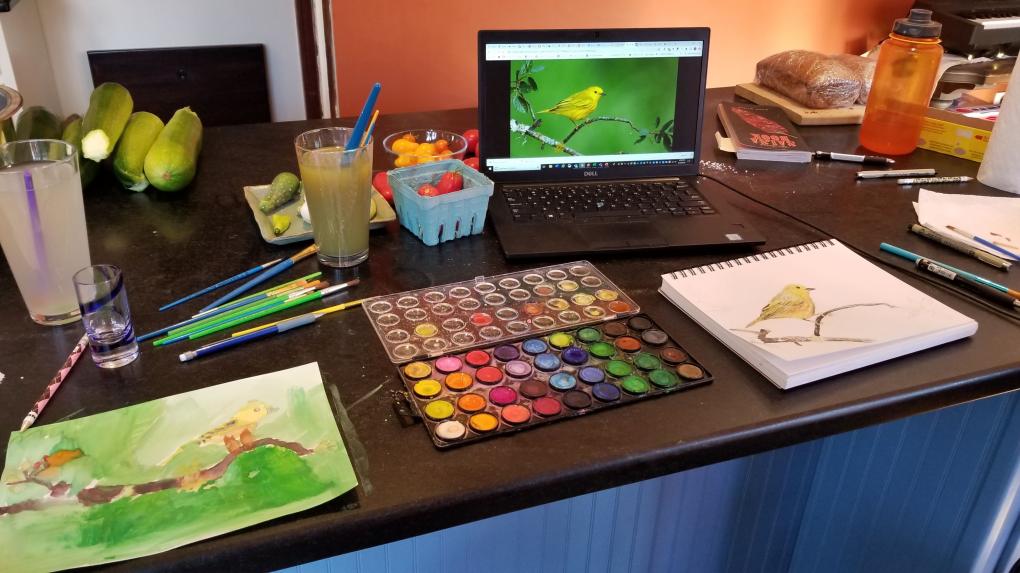
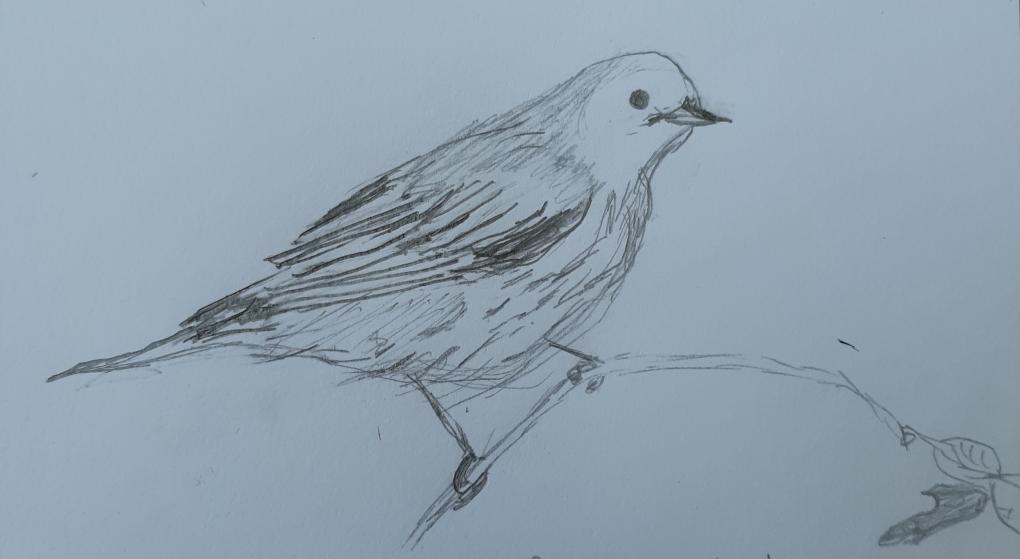 It was easy to get lost in the detail and miss the overall shape.
Nice to notice the many layers and different angles of the wings. Thanks to the bird for HOLDING STILL. 😇
It was easy to get lost in the detail and miss the overall shape.
Nice to notice the many layers and different angles of the wings. Thanks to the bird for HOLDING STILL. 😇 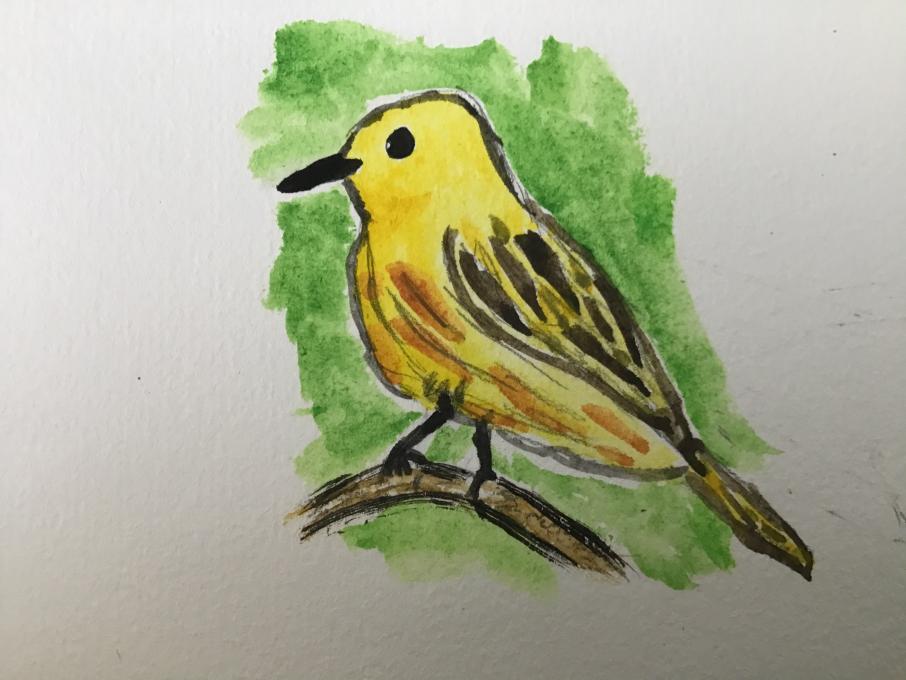
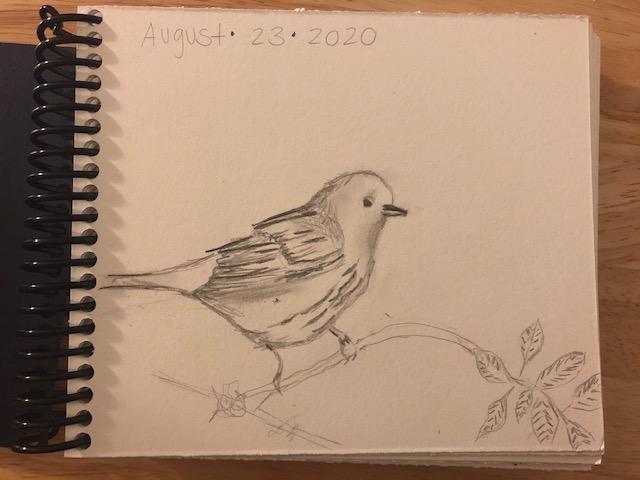 How did you feel about drawing from the photo? I prefer to be outside verse at my computer. (I teach online due to covid, and spend too much time on my chromebook! )
What came easily and what was challenging? I feel more confident in plants than birds, I think the dark black lines draw you into this sketch.I could not figure the correct shape or size for the head of this bird.
Was there anything in the photo that you might not have noticed if you weren’t asked to draw it? Would this make a difference when nature journaling? I really began to look at where the tail wad located and the shape of the break. I also began to notice the colors and lichen on the tree branch. The shades of yellow on the bird's feathers.
How did you feel about drawing from the photo? I prefer to be outside verse at my computer. (I teach online due to covid, and spend too much time on my chromebook! )
What came easily and what was challenging? I feel more confident in plants than birds, I think the dark black lines draw you into this sketch.I could not figure the correct shape or size for the head of this bird.
Was there anything in the photo that you might not have noticed if you weren’t asked to draw it? Would this make a difference when nature journaling? I really began to look at where the tail wad located and the shape of the break. I also began to notice the colors and lichen on the tree branch. The shades of yellow on the bird's feathers.
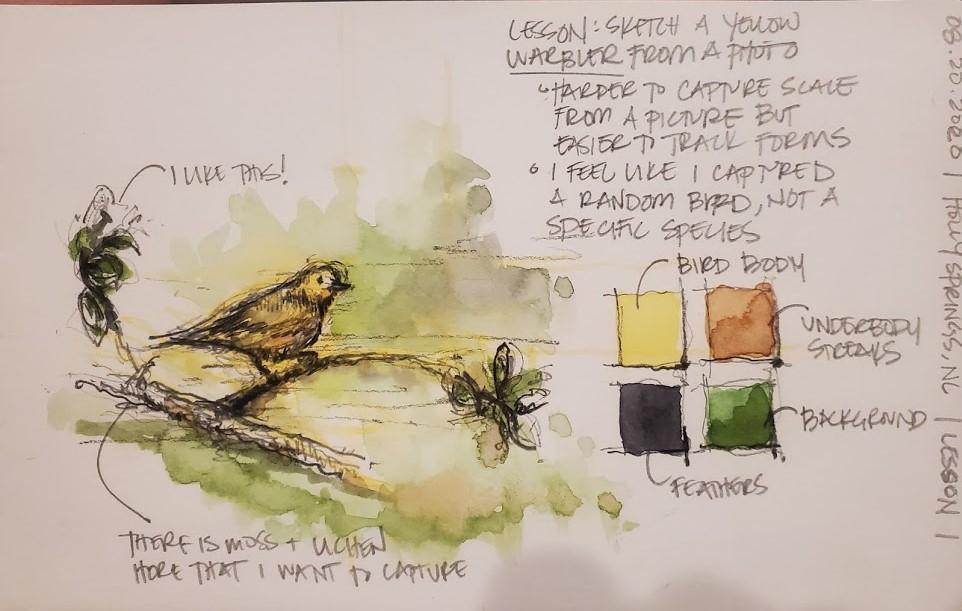
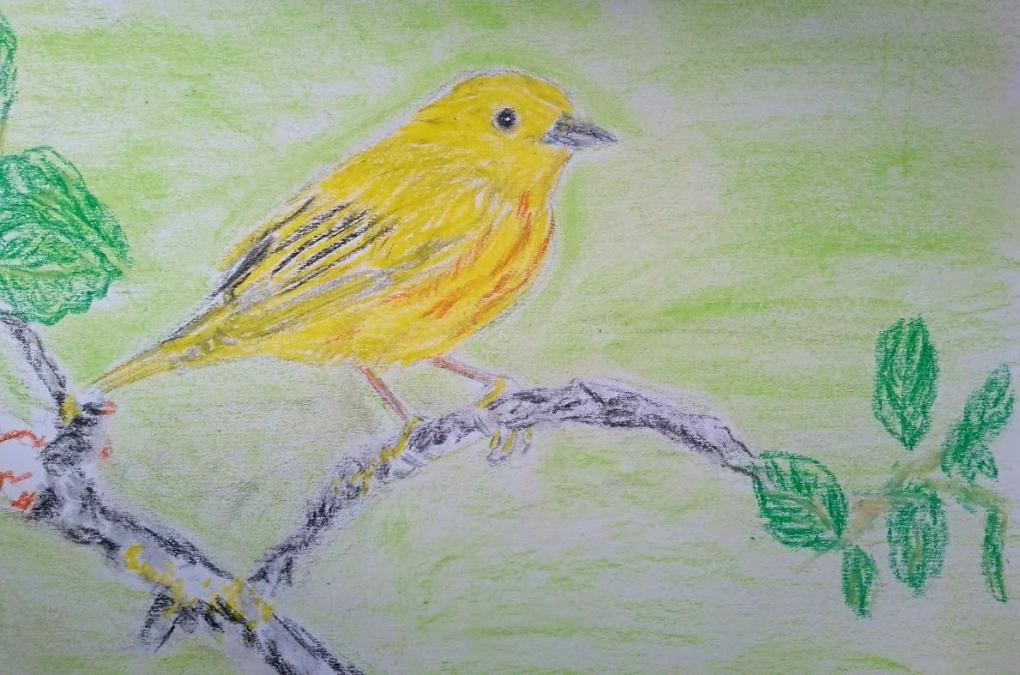
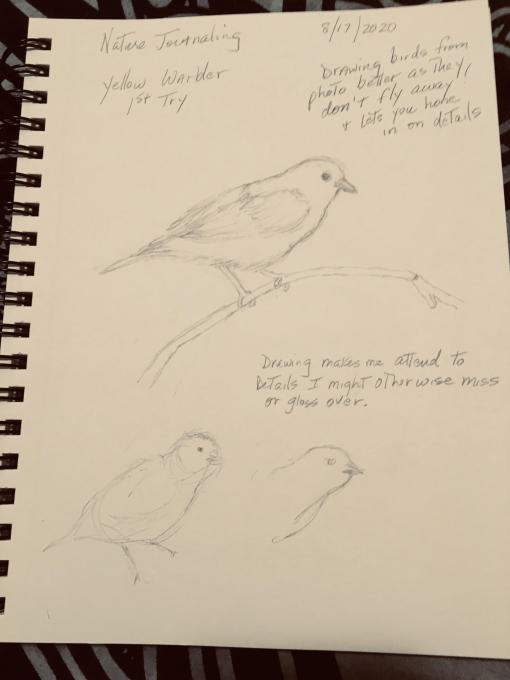
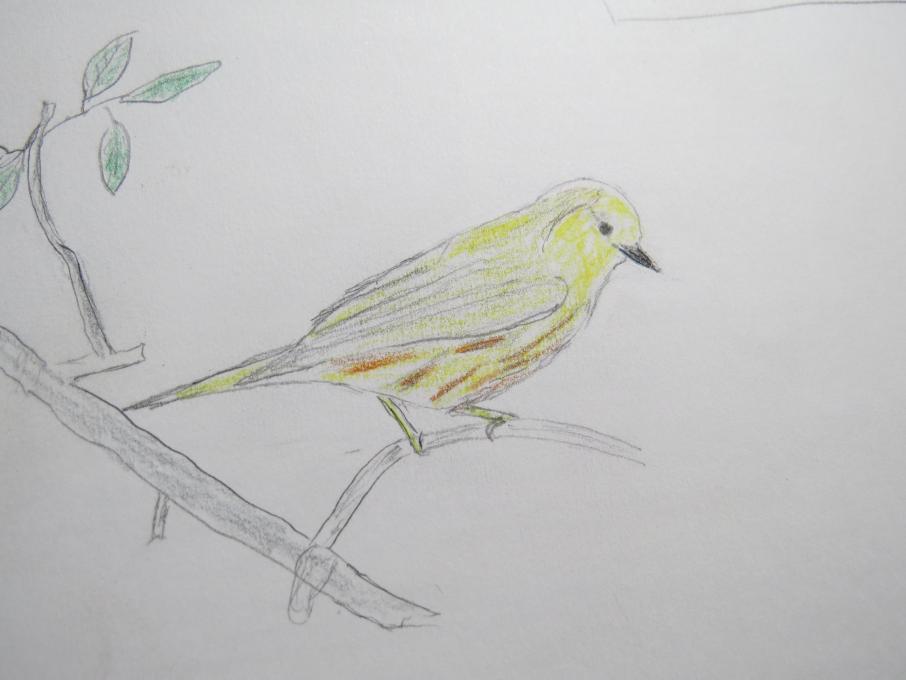 I enjoyed drawing from the photo, since I could focus on details without having to rely on my memory or worrying about the bird flying off. The easiest was approximating the general shape of the warbler. The more challenging aspects were reproducing the relative orientations of the different parts of the anatomy: head angle, leg placement, layering of wing feathers, and eye size direction of gaze. My color and color distribution was off as well. There were so many details I would have missed, if I had not attempted to draw the warbler, not that I was able to reproduce them in my drawing. I do think that including sketches in my nature journals would improve them a lot.
I enjoyed drawing from the photo, since I could focus on details without having to rely on my memory or worrying about the bird flying off. The easiest was approximating the general shape of the warbler. The more challenging aspects were reproducing the relative orientations of the different parts of the anatomy: head angle, leg placement, layering of wing feathers, and eye size direction of gaze. My color and color distribution was off as well. There were so many details I would have missed, if I had not attempted to draw the warbler, not that I was able to reproduce them in my drawing. I do think that including sketches in my nature journals would improve them a lot. 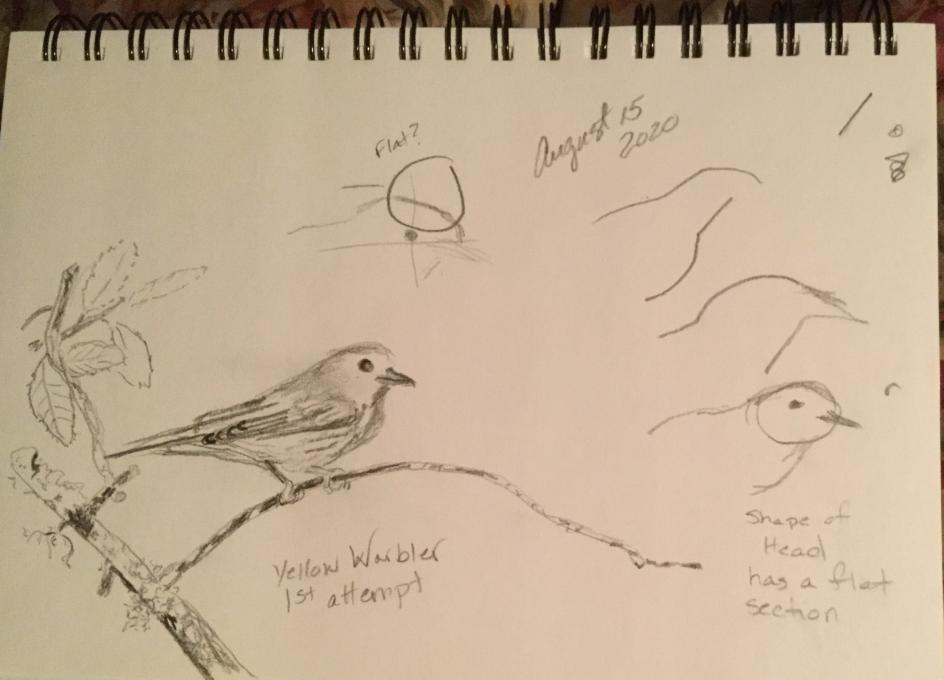 It was difficult to decide where to begin. I chose the branch. The feet were surprisingly easier than I thought and the part that seemed easy at a glance proved elusive. I could not get the head shape right from my eyes to the paper. The proportion fell short and while quick sketching I don’t erase so he has more of a dove shape. In the wild I’m certain to have missed the claws just so on the branch and those burnished streaks on the throat as individual marks. Looking forward to instruction on proportion and pencil techniques.
It was difficult to decide where to begin. I chose the branch. The feet were surprisingly easier than I thought and the part that seemed easy at a glance proved elusive. I could not get the head shape right from my eyes to the paper. The proportion fell short and while quick sketching I don’t erase so he has more of a dove shape. In the wild I’m certain to have missed the claws just so on the branch and those burnished streaks on the throat as individual marks. Looking forward to instruction on proportion and pencil techniques. 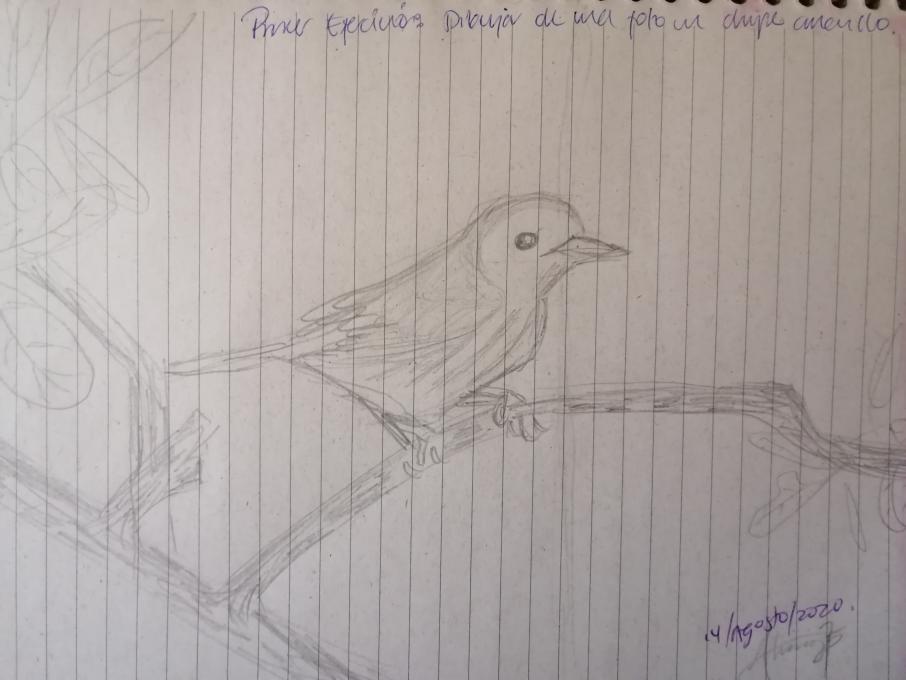
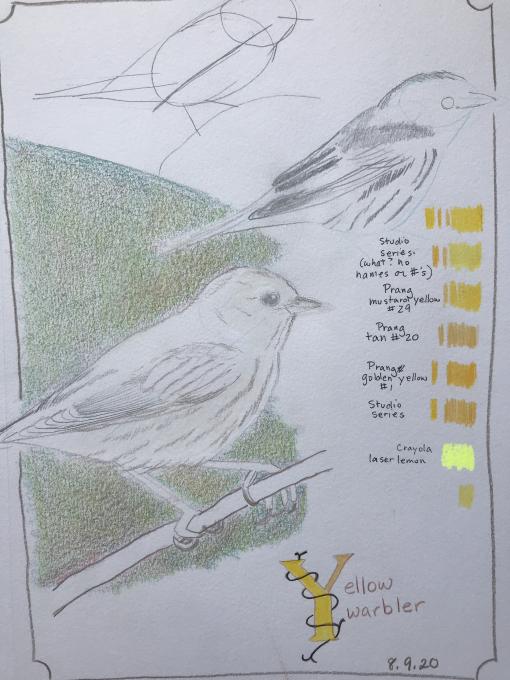
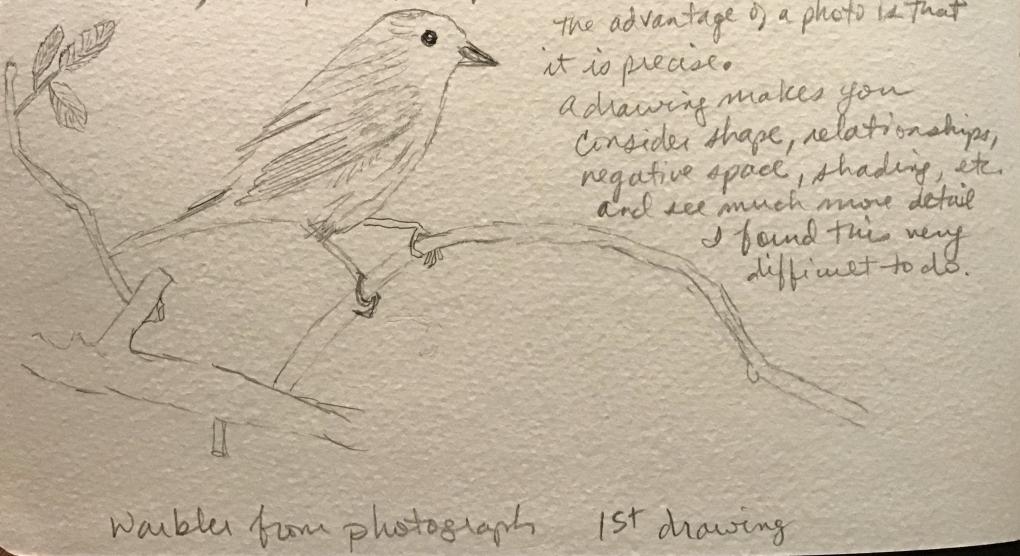
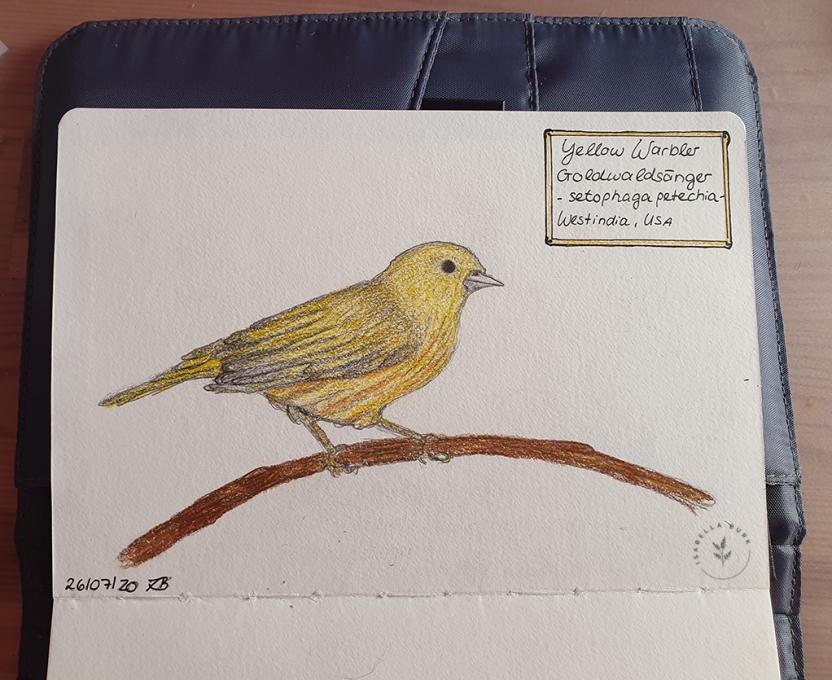 Hello all,
the warbler was a very nice starter project. I enjoyed studying the colorful feathers and their different yellow tones. This drawing was done by color pencil on watercolor paper. In future I want to use watercolor as my previous colors.
I love all the different warblers here in this community. It is always great to be surounded by other nature-addicted artists. Looking forward to more!
Hello all,
the warbler was a very nice starter project. I enjoyed studying the colorful feathers and their different yellow tones. This drawing was done by color pencil on watercolor paper. In future I want to use watercolor as my previous colors.
I love all the different warblers here in this community. It is always great to be surounded by other nature-addicted artists. Looking forward to more! 
